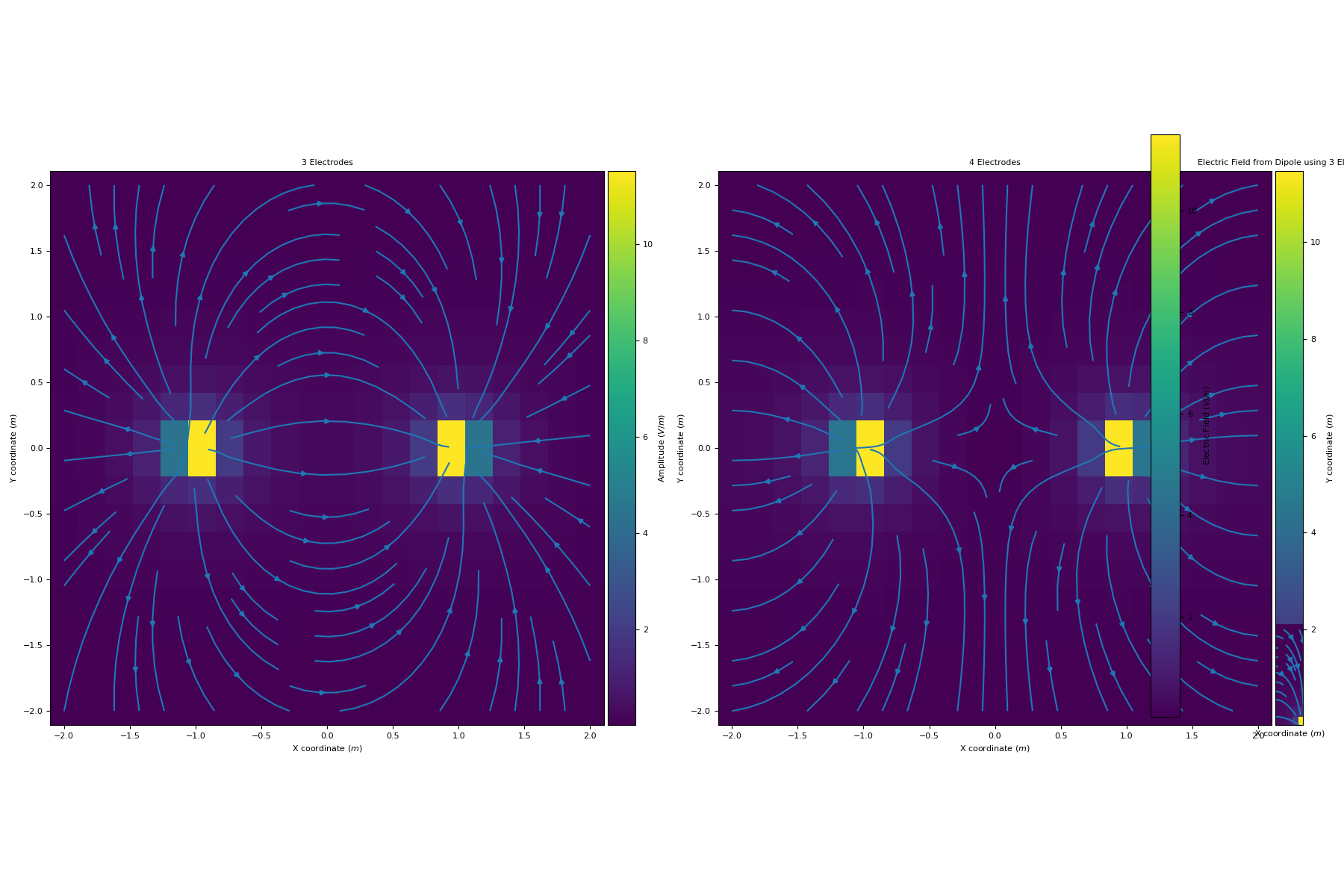geoana.em.static.DipoleHalfSpace.electric_field#
- DipoleHalfSpace.electric_field(xyz_m, xyz_n=None)#
Electric field for a dipole source in a halfspace.
This method computes the electric field for a dipole source in a halfspace at the set of gridded xyz locations provided. Where \(-\nabla V\) is the negative gradient of the electric potential for a dipole source. The electric field \(\mathbf{E}\) is:
\[\mathbf{E} = -\nabla V\]- Parameters:
- xyz_m(…, 3) numpy.ndarray
Location of the M voltage electrode.
- xyz_n(…, 3) numpy.ndarray, optional
Location of the N voltage electrode.
- Returns:
- E(…, 3) np.ndarray
Electric field of point current in units \(\frac{V}{m}\).
Examples
Here, we define a dipole source in a halfspace to compute electric field.
>>> import numpy as np >>> import matplotlib.pyplot as plt >>> from mpl_toolkits.axes_grid1 import make_axes_locatable >>> from geoana.em.static import DipoleHalfSpace
Define the dipole source.
>>> rho = 1.0 >>> current = 1.0 >>> location_a = np.r_[-1, 0, 0] >>> location_b = np.r_[1, 0, 0] >>> simulation = DipoleHalfSpace( >>> current=current, rho=rho, location_a=location_a, location_b=location_b >>> )
Now we create a set of gridded locations and compute the electric field.
>>> X, Y = np.meshgrid(np.linspace(-2, 2, 20), np.linspace(-2, 2, 20)) >>> Z = np.zeros_like(X) >>> xyz = np.stack((X, Y, Z), axis=-1) >>> e1 = simulation.electric_field(xyz) >>> e2 = simulation.electric_field(xyz - np.r_[2, 0, 0], xyz + np.r_[2, 0, 0])
Finally, we plot the electric field.
>>> fig, axs = plt.subplots(1, 2, figsize=(18,12)) >>> titles = ['3 Electrodes', '4 Electrodes'] >>> for ax, E, title in zip(axs.flatten(), [e1, e2], titles): >>> E_amp = np.linalg.norm(E, axis=-1) >>> im = ax.pcolor(X, Y, E_amp, shading='auto') >>> divider = make_axes_locatable(ax) >>> cax = divider.append_axes("right", size="5%", pad=0.05) >>> cb = plt.colorbar(im, cax=cax) >>> cb.set_label(label= 'Amplitude ($V/m$)') >>> ax.streamplot(X, Y, E[..., 0], E[..., 1], density=0.75) >>> ax.set_ylabel('Y coordinate ($m$)') >>> ax.set_xlabel('X coordinate ($m$)') >>> ax.set_aspect('equal') >>> ax.set_title(title)
Finally, we plot the electric field.
>>> E_amp = np.linalg.norm(e1, axis=-1) >>> plt.pcolor(X, Y, E_amp, shading='auto') >>> cb = plt.colorbar() >>> cb.set_label(label= 'Electric Field ($V/m$)') >>> plt.streamplot(X, Y, e1[..., 0], e1[..., 1], density=0.75) >>> plt.ylabel('Y coordinate ($m$)') >>> plt.xlabel('X coordinate ($m$)') >>> plt.title('Electric Field from Dipole using 3 Electrodes')
>>> plt.tight_layout() >>> plt.show()
(
Source code,png,pdf)